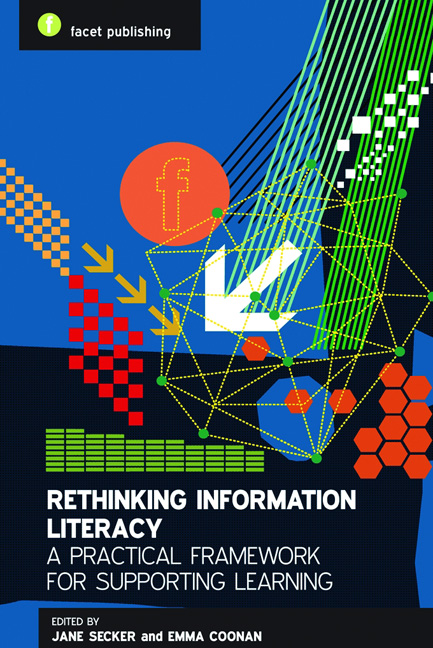Book contents
- Frontmatter
- Contents
- Acknowledgements
- Contributor profiles
- Introduction
- Strand One Transition from school to higher education
- Strand Two Becoming an independent learner
- Strand Three Developing academic literacies
- Strand Four Mapping and evaluating the information landscape
- Strand Five Resource discovery in your discipline
- Strand Six Managing information
- Strand Seven The ethical dimension of information
- Strand Eight Presenting and communicating knowledge
- Strand Nine Synthesizing information and creating new knowledge
- Strand Ten The social dimension of information
- Afterword: ‘Ownership is a flawed concept’
- Conclusion
- Appendix 1 A New Curriculum for Information Literacy (ANCIL): the curriculum
- Appendix 2 ANCIL Lesson Plan
- Appendix 3 ANCIL Institutional Audit: worksheet
- Appendix 4 ANCIL Institutional Audit: interview questions
- Index
- Miscellaneous Endmatter
- Miscellaneous Endmatter
- Miscellaneous Endmatter
- Miscellaneous Endmatter
Conclusion
Published online by Cambridge University Press: 08 June 2018
- Frontmatter
- Contents
- Acknowledgements
- Contributor profiles
- Introduction
- Strand One Transition from school to higher education
- Strand Two Becoming an independent learner
- Strand Three Developing academic literacies
- Strand Four Mapping and evaluating the information landscape
- Strand Five Resource discovery in your discipline
- Strand Six Managing information
- Strand Seven The ethical dimension of information
- Strand Eight Presenting and communicating knowledge
- Strand Nine Synthesizing information and creating new knowledge
- Strand Ten The social dimension of information
- Afterword: ‘Ownership is a flawed concept’
- Conclusion
- Appendix 1 A New Curriculum for Information Literacy (ANCIL): the curriculum
- Appendix 2 ANCIL Lesson Plan
- Appendix 3 ANCIL Institutional Audit: worksheet
- Appendix 4 ANCIL Institutional Audit: interview questions
- Index
- Miscellaneous Endmatter
- Miscellaneous Endmatter
- Miscellaneous Endmatter
- Miscellaneous Endmatter
Summary
[O]ur society and all of its institutions are in continuing processes of transformation…. We must learn to understand, guide, influence and manage these transformations. We must make the capacity for undertaking them integral to ourselves and to our institutions. We must, in other words, become adept at learning.
Schon (1973, 28)One of the greatest challenges for education has always been to help students to develop a questioning mind – an outlook which necessitates a critical approach to dealing with information and the capacity to evaluate and synthesize multiple perspectives on an issue. It also involves an understanding of how information is transformed into knowledge, and a recognition that learning is sometimes a challenging process, as it may involve assimilating new knowledge that challenges our world view.
In earlier times, information, knowledge and learning were privileged and scarce commodities accessible only to an elite, and controlled and mediated by teachers, librarians and other ‘gatekeepers’. In the digital age, however, there is an abundance of information: knowledge and learning are more widely accessible than ever before, often in an unmediated form. The role of the librarian may be slowly evolving from the gatekeeper of knowledge, to a facilitator of learning, helping develop autonomy in students and impart a capacity for lifelong learning. Conversely, however, teachers and faculty observe that students, rather than becoming more independent in their approach to learning and more critical of the information they find, seem to be becoming less questioning and more dependent on teachers.
The central role that information and knowledge plays in learning means that in any discipline there needs to be an explicit approach to dealing with them. In the library world we call that capability ‘information literacy’. Librarians are the natural partners to work with teachers to develop this learning framework in students, and to embed its development into the curriculum. This task is too big for one group in education to tackle alone and only by working together can we create a truly learner-focused environment. Yet perhaps the greatest challenge in the coming few years for those in the information and library profession is one of status and perceptions about their role.
- Type
- Chapter
- Information
- Rethinking Information LiteracyA practical framework for supporting learning, pp. 141 - 146Publisher: FacetPrint publication year: 2012



